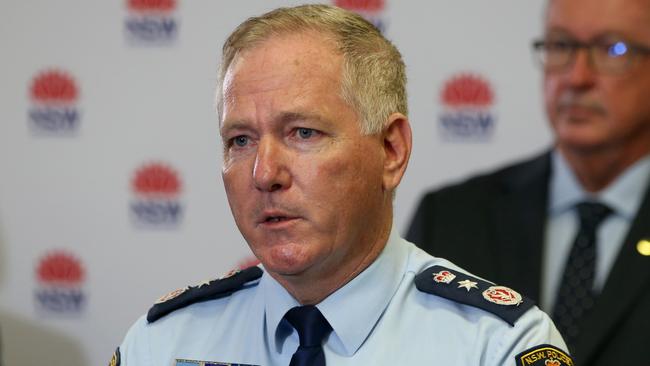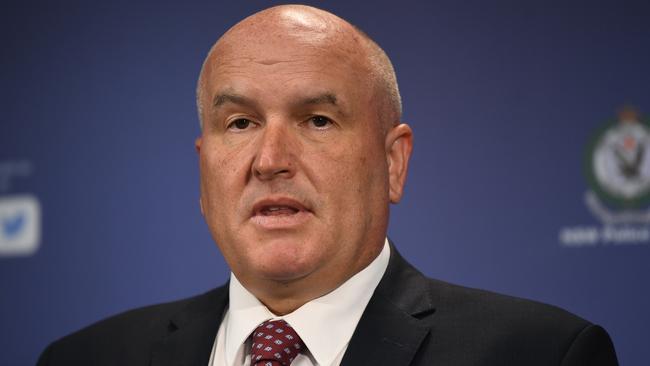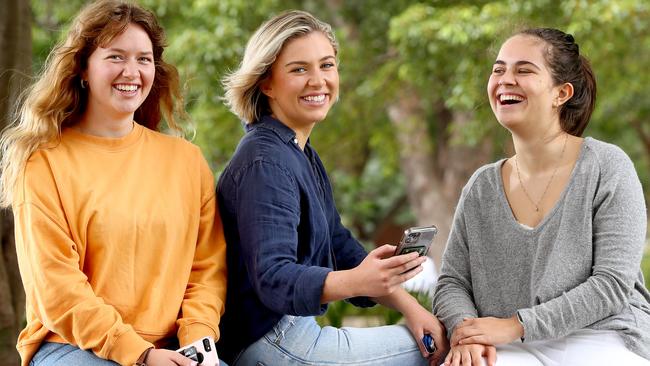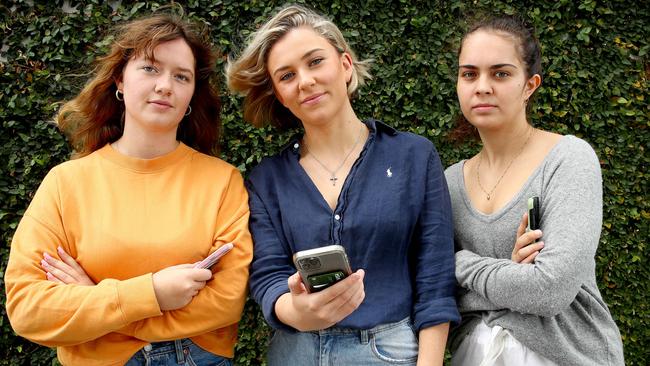NSW police commissioner proposes consent app to combat sexual assault
The state’s top cop has proposed using technology such as an app to record consent for sexual activity as he declared consent can “no longer be implied”.
NSW
Don't miss out on the headlines from NSW. Followed categories will be added to My News.
The state’s top cop has proposed using technology such as an app to record consent for sexual activity in order to combat rising sex assaults as he declared consent can “no longer be implied”.
Police Commissioner Mick Fuller said police were grappling with rising sexual assault figures and low conviction rates, saying Australia needed to modernise its attitudes on the importance of actively agreeing to sexual activity.
Mr Fuller’s intervention comes as the NSW government faces calls to reform laws to require active consent, and calls to include consent education at schools.
“The conversation around sex and consent seems to be anchored to the ‘50s and clearly it isn’t working,” Mr Fuller said.
Noting that other countries have a “positive consent approach”, Mr Fuller revealed he had been closely considering the role of technology in recording consent.
The idea behind consent apps is they normalise conversations around consent and formalise the habit of actively seeking it.
“There is no implied consent. It needs to be positive consent. How do we do that in this day and age? One option is with technology,” Mr Fuller said.
“You can’t walk into a shop at the moment without scanning in. Two years ago I would have said ‘you’re mad, I’m not doing that’.
“Do we protect people dating by having a positive affirmation … in an app?
“People say ‘how unromantic is that’. But think of how many people are looking for friendship and love online — it’s not as though technology and dating are foreign to us.”
He conceded an app could provide challenges such as if someone withdrew consent after agreeing.
“I know there are challenges. But this would be a good starting point,” he said.
Such an app has been launched in Denmark, after the legal definition of rape was expanded to include sex without explicit consent.
Legal experts take issue with the idea of an app as admissible evidence of consent.
“It would be highly problematic and difficult to admit into evidence,” Greg Barns, national criminal justice spokesman for the Australian Lawyers Alliance said.
In the year to June 2019, police received 14,171 reports of alleged sexual assaults. Just 1099 progressed to finalised charges and of those only 376 recorded guilty verdicts.
Mr Fuller said the statistics exposed “just how poor the outcome is for victims”. He said victims wanted accountability.

Mr Fuller said often perpetrators are friends or acquaintances and juries struggle with these convictions. He said attitudes that blame a woman affected by drugs or alcohol for consent problems were harmful and wrong.
“There is no social contract that inviting someone into your home is an invitation for sex,” Mr Fuller said.
“When someone, often a young woman, comes forward, police have to explain to them the journey ahead to conviction. It’s a bloody tough one.
“Sometimes police are accused of talking victims out of it but the victims need to know they may have barristers yelling at them, there’ll be people calling them liars in the box.
“Juries are struggling to come to terms with consent and we’ve seen high-profile matters before the courts with hung juries where they were reputable, decent witnesses.”

NSW Police Minister David Elliott said: “I am heartened that there is a debate on consent and pleased the NSW Police will take a lead role.”
He said he had “serious and daily” discussions at home as the father of two teenage boys.
“The first call from me, as the NSW Police Minister but also as a father, is that parents have to teach their children respect for women. But I also say to the community, it is everybody’s responsibility to educate our young men.”
NSW Labor upper house MP Rose Jackson said “the positive engagement from NSW Police on what is clearly an issue of real concern for young people, particularly young women, is fantastic”.
“The issue of how difficult it is to secure convictions through courts is a major one,” she said.
Attorney-General Mark Speakman is considering recommendations from the Law Reform Commission on consent law.
YOUNG WOMEN UNSURE ABOUT APP IDEA
It’s the generation who grew up living their lives online from dating apps to food delivery.
But technology is not always the answer, young women said yesterday in response to the idea that a mobile phone app could be used to digitally record sexual consent.
University of Sydney student Kate Pickard, 21, said any sort of app documenting an agreement prior to sex could never take into account that women were free to change their minds at any time.


“Consent can change, second to second, minute to minute. Just because you agreed to something doesn’t mean you cannot change your mind,” she said.
“It would cause a bit of an issue if someone can pull out a document and say you consented when you changed your mind at some point.”
For fellow student Lauren McGrath-Wild, 20, better education in schools seemed like the best thing to tackling the issue of consent — and done as early as primary school instead of waiting to university when many students must complete an online module.
“I came to university and learnt about consent and for a lot of women that is the first time they think that something might have happened to them when they were younger which wasn’t right,” she said.
Ms McGrath-Wild also said documenting consent seemed to serve the purpose of protecting men from allegations of rape rather than keeping women safe.
“It seems like it could be used as a way of excusing male behaviour which is unacceptable,” she said.
Sophie Bell, 20, also dismissed the idea of an app.
“With social media, parents don’t really know what is going on in their child’s life. The focus needs to be on education not just for a young person, but for the family as well to shift attitudes because some men have a superiority complex and they can do anything they want,” she said.



